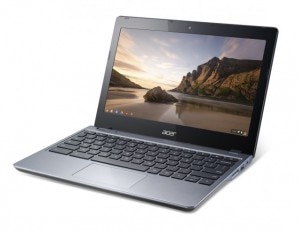So you’re thinking of replacing your laptop this year and the inexpensive Google Chromebook — a PC with the cloud-based Chrome operating system — is an enticing option.
Nine models are currently available from four manufacturers (Acer, HP, Samsung, and Toshiba). The prices range from $199 to $329, with the exception of the Google Pixel, which comes with a high-resolution display and starts at $1,299.
When evaluating purchasing a Chromebook as your primary work computer, here are a few pros and cons to consider:
Pro: The systems are extremely cheap. With the exception of the Google Pixel, the Chromebooks are some of the most affordable new laptops on the market. Even if you don’t have much of an equipment budget, you can probably afford one. What’s more, if it gets broken or stolen, it’s likely to have a much less significant impact on your bottom line than the loss of a $2,000 MacBook.
Con: Their functionality is limited. Can you do all of your work-related tasks within the Chrome browser? If you mostly use your laptop to browse the web, send email, use social networks, and do some basic word processing, your answer may be “yes.” But note that, if you ever run sophisticated graphic design or video-editing software, you won’t be able to do so on a Chromebook. Skype (which is owned by Microsoft) is unavailable, too, although Google Hangouts offer similar functionality. Before you switch to a Chromebook, spend a few days using nothing but the Chrome browser on your existing computer to see whether the more streamlined OS meets your needs.
Pro: Data storage and software/security upgrades are fully automated. If you’re not so great about backing up your files on a regular basis (or even saving documents in progress), the Chrome OS is an ideal solution. The system backs up your data to the cloud several times a minute without any prompting. You can then access your files from Google Drive on any computer or device in the world, no matter where you are. Additionally, the Chrome OS automatically installs software and security updates every time you reboot your computer, requiring no effort on your part.
Con: You need an internet connection to access most of your apps. If you do a lot of work offline, switching to a Chromebook could be problematic. Some apps, including Google Docs and Gmail, can still be accessed without an internet connection because local versions are cached on your Chromebook, but you won’t be able to send email, for example, until you reconnect with the web. Others apps available in the Chrome store, such as the photo editing tool Pixlr Editor, won’t function at all unless you’re online.
So is a Chromebook right for you? If your computing needs are minimal and you have steady internet access, a Chromebook may be a good alternative to a more expensive laptop. But if you need more functionality or work offline on a regular basis, it may be best to consider a Chromebook only as a backup computer, if at all.










